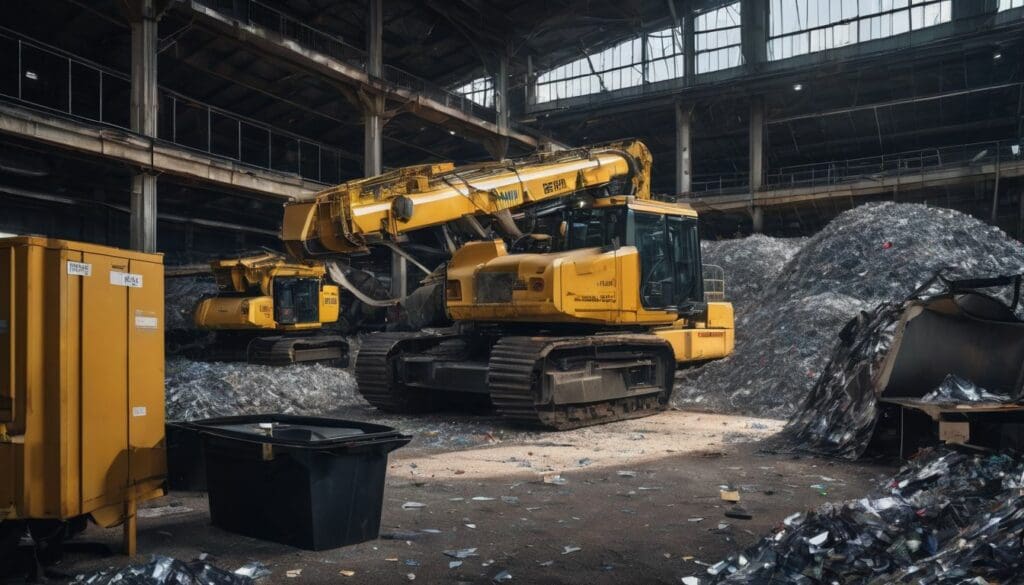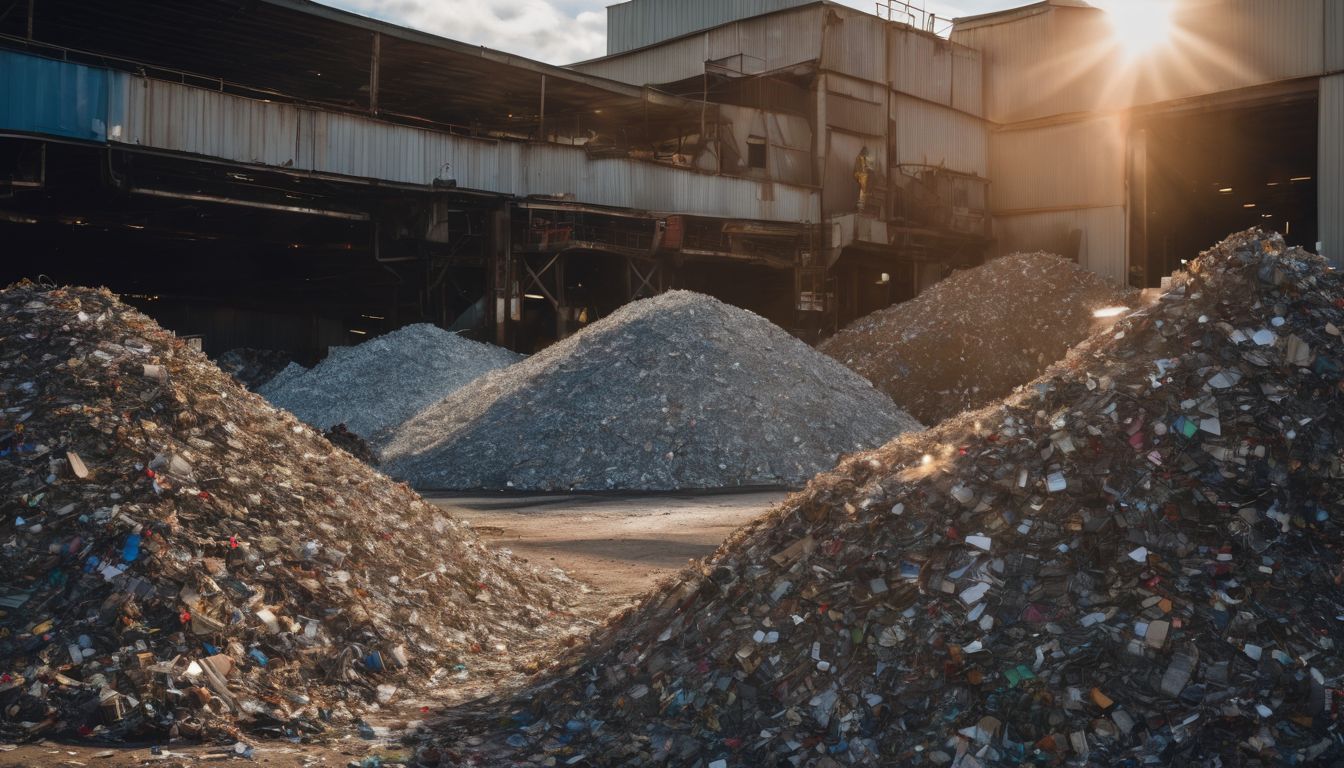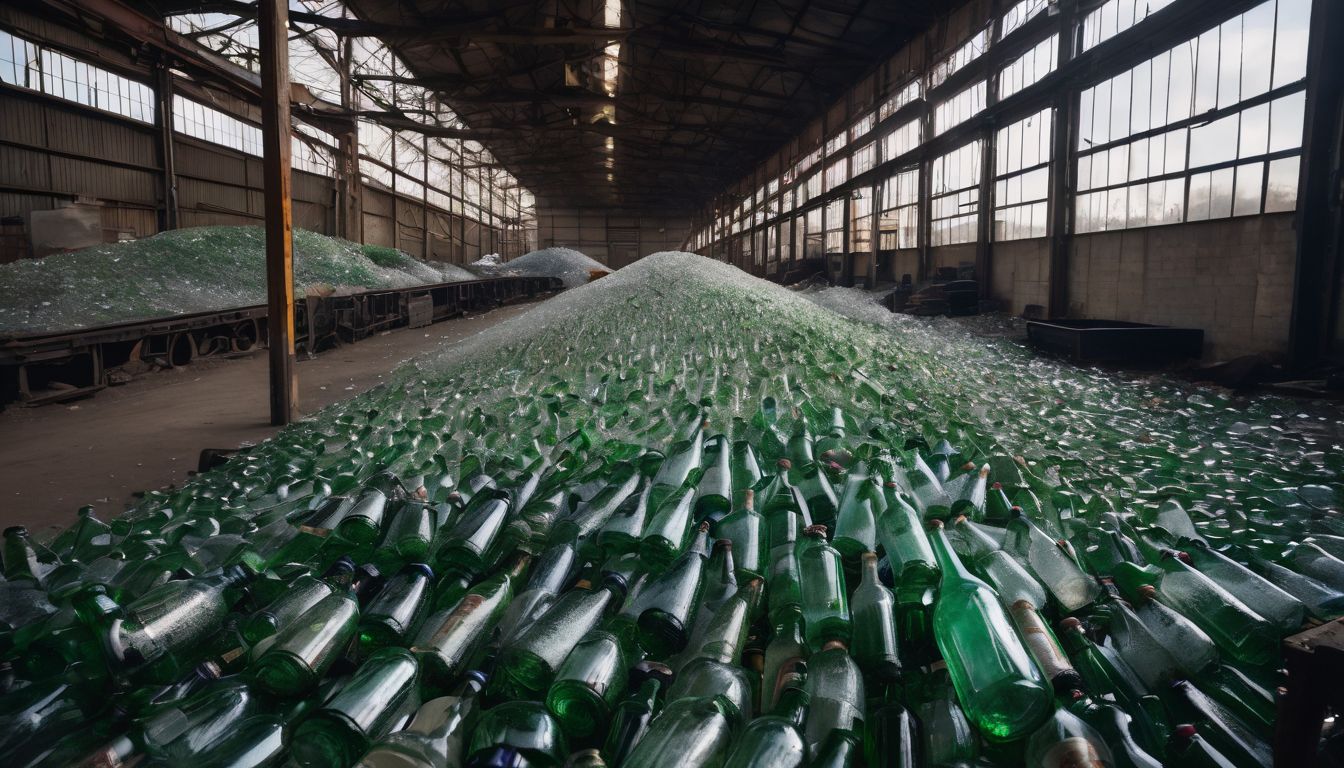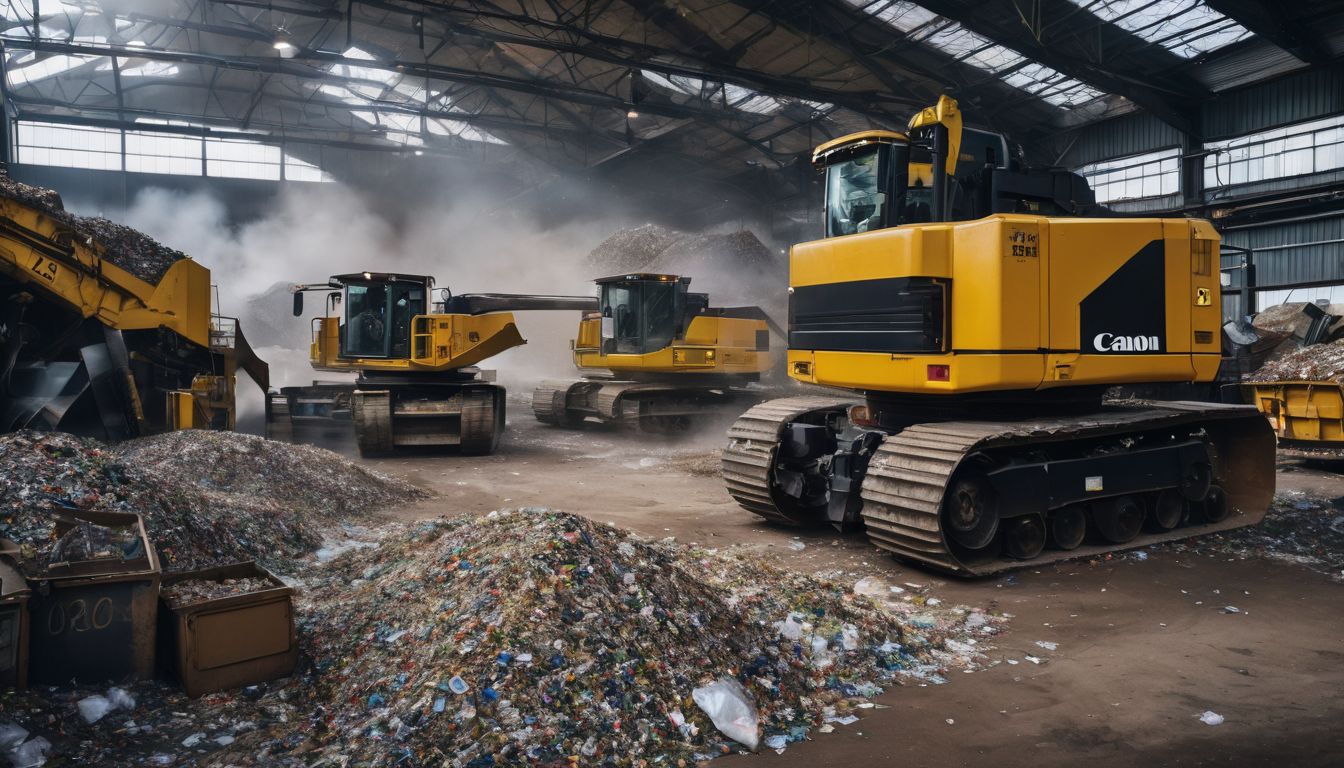Recycling isn’t just about throwing paper and cans into a bin anymore. Every year, we produce over two billion tonnes of waste globally. Our blog will take you through the revolutionary tech that’s transforming rubbish into resource, making recycling smarter and more effective than ever.
Discover how your efforts matter!
Key Takeaways
- Arqlite is leading a recycling revolution by turning difficult-to-recycle plastics into sustainable materials for construction and landscaping, helping reduce the environmental damage from plastic waste.
- Aquaponics gardening merges fish farming with plant cultivation, creating a water-saving eco-system that produces food efficiently and sustainably without using soil or chemical fertilisers.
- The construction industry is embracing recycled materials such as glass, rubber, and plastics to build greener projects. This shift reduces landfill waste, conserves resources and energy, and points towards a future of sustainable building practices.
The History and Current State of Recycling Technology
Recycling has evolved from simple, manual sorting to complex processes involving advanced technology. In the early days, people mainly reused and repurposed materials out of necessity.
As societies grew, the creation of waste became a bigger issue, leading to the first recycling plants in the 19th century where paper and other materials were reprocessed. Fast forward to today, and we see high-tech facilities utilising cutting-edge machinery for separation based on size, weight, magnetic properties and even optical sensors that can identify different types of plastics.
Technological advancements have significantly improved waste management systems worldwide. Innovations like chemical recycling break down plastics into their original components for new products; a leap towards plastic conservation.
Advanced sorting technologies separate recyclables with unprecedented precision while Internet of Waste concepts use data analytics for better resource recovery. Moreover, recycling robots have begun to emerge on production lines, working tirelessly to sort through mountains of rubbish faster than humans ever could.
These developments are crucial stepping stones within the circular economy framework that promotes sustainability by turning waste back into valuable resources without depleting more natural assets.
The Impact of Climate Change and the Need for Recycling
Climate change poses significant threats to our planet, including rising temperatures, extreme weather events, and sea level rise. These changes affect ecosystems, wildlife habitats, and food production.
By recycling, we can reduce the amount of waste that ends up in landfills and incinerators. This helps lower greenhouse gas emissions which contribute to climate change. Recycling also conserves natural resources such as water and timber, by reducing the need for raw materials.
The urgent need for recycling is evident in the growing environmental crisis caused by climate change. Adopting sustainable waste management practices is crucial in mitigating these impacts by reducing our carbon footprint.
Through reuse incentivisation and environmental policies promoting sustainable technology innovations, we can work towards a more eco-friendly future with effective waste valorisation and renewable energy sources.
Challenges and Opportunities in Different Industries
The challenges and opportunities in different industries like food, manufacturing, fashion, and technology highlight the need for innovative recycling solutions to reduce waste and promote sustainability.
If you want to learn more about how these industries are tackling their recycling challenges, keep reading!
Food
Restaurants and food manufacturers are exploring innovative ways of reducing waste by implementing recycling programmes. Many businesses have adopted composting practices to minimise organic waste, diverting it from landfills and converting it into nutrient-rich soil for gardening or agriculture.
In addition, initiatives promoting sustainable packaging solutions in the food industry are gaining traction, leading to the reduction of single-use plastics and other non-recyclable materials.
As consumers become more environmentally conscious, there is a growing demand for eco-friendly practices within the food sector. This has led to an increase in the use of biodegradable containers and utensils made from recycled materials.
By embracing these changes, the food industry can significantly contribute to environmental conservation efforts through waste reduction and sustainable development.
Manufacturing
Manufacturing processes play a key role in the future of recycling technology. The implementation of eco-friendly innovations and reuse incentives within the manufacturing industry can significantly reduce waste and environmental impact.
Green technology and recycling developments have the potential to transform how materials are used, reused, and repurposed in manufacturing, creating a positive ripple effect on conservation efforts.
Moving forward to our next focus – “Fashion”.
Fashion
Fashion industry is a major contributor to environmental pollution due to its high resource consumption and waste production. However, innovative recycling technologies are emerging to address these issues.
Eco-conscious brands are incorporating recycled materials into their designs, reducing the demand for new resources and minimising waste. Increasingly, consumers are embracing sustainable fashion choices that support conservation and environmental protection.
Leading the way in eco-friendly innovations, Arqlite’s approach to plastic recycling creates lightweight aggregates used in various industries including fashion. By repurposing plastic waste into durable and versatile materials, this technology reduces the environmental impact of clothing production while promoting a circular economy.
Technology
Recycling technology is continuously evolving, with new eco-friendly innovations paving the way for a more sustainable future. Companies like Arqlite are revolutionising plastic recycling by creating building materials from discarded plastics, reducing environmental impact.
Aquaponics gardening presents a water-saving solution, merging aquaculture and hydroponics to cultivate plants without soil while using fish waste as natural fertiliser. In construction, the use of recycled materials not only minimises waste but also decreases reliance on raw resources, contributing to a greener environment.
Innovative technologies in recycling offer hope for a cleaner planet and play a pivotal role in preserving natural resources. With advancements such as upcycling plastic waste into durable products and embracing innovative agricultural practices, the future of recycling technology holds promise for mitigating climate change and promoting sustainability.
Innovations and Future of Recycling Technology
Arqlite is revolutionising plastic recycling by creating eco-friendly materials from hard-to-recycle plastics. Aquaponics gardening offers a water-saving solution for sustainable agriculture, while construction companies are increasingly using recycled materials in building projects to reduce waste and environmental impact.
Arqlite’s Approach to Plastic Recycling
Arqlite improves plastic recycling by transforming difficult-to-recycle materials into valuable resources. Their innovative process separates mixed plastics and converts them into durable, sustainable products that can be used in construction and landscaping.
By reusing plastic waste, Arqlite reduces environmental impact and supports a circular economy.
Their method involves cleaning the plastics, removing any impurities, and compressing them to form small beads called “arqbeads.” These arqbeads are then utilised in various applications like creating green spaces or constructing new buildings.
Aquaponics Gardening as a Water-Saving Solution
Aquaponics gardening offers a sustainable and water-efficient way to grow plants, making it an eco-friendly solution for environmentally conscious individuals. By combining aquaculture and hydroponics, this method allows for the growth of both fish and plants in a symbiotic environment.
The fish waste provides nutrients for the plants, while the plants naturally filter and clean the water for the fish. This closed-loop system minimises water usage, making it a practical choice for those looking to conserve water resources.
In addition to being water-saving, aquaponics gardening also promotes sustainable food production by eliminating the need for chemical fertilisers and reducing overall environmental impact.
The Use of Recycled Materials in Construction
Recycled materials are increasingly being used in construction to reduce the environmental impact of building projects. Waste materials like glass, plastic, and rubber are repurposed into insulation, flooring, and even structural components.
This not only reduces the amount of waste going to landfills but also conserves natural resources and lowers energy consumption in manufacturing new materials.
Innovative methods such as 3D printing with recycled plastic or using reclaimed timber for interior finishes showcase the potential for sustainable construction practices. The use of recycled materials in construction is a vital step towards creating more eco-friendly buildings that contribute to a healthier planet.
Conclusion
Innovative recycling technology is paving the way for a more sustainable future. Companies are exploring new methods to recycle materials and reduce waste. The future of recycling technology looks promising, with advancements in plastic recycling, water conservation, and recycled materials in construction.
These innovations offer hope for a cleaner and healthier planet.
FAQs
1. What is the future of recycling technology?
The future of recycling technology includes exciting new innovations that will make sorting and reusing materials more efficient.
2. How will these innovations change the way we recycle?
Recycling innovation will streamline processes, saving time and improving how we manage waste effectively.
3. Can new technology make recycling easier for people?
Yes, advancements in recycling tech aim to simplify the process for individuals, making it more accessible for everyone to participate.
4. Will future technologies handle different types of recyclable materials?
Upcoming technological breakthroughs are expected to tackle a wider array of materials, enhancing our capacity to recycle diverse items with ease.





